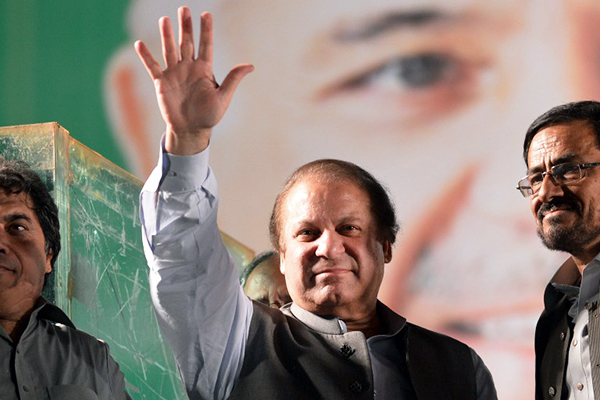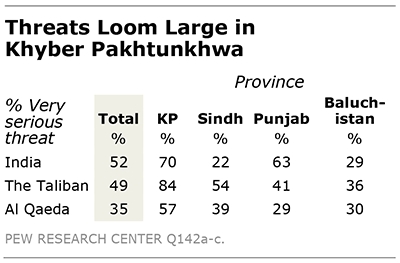
Aamir Qureshi—AFP
Latest poll puts Nawaz Sharif six points ahead of Imran Khan.
Nawaz Sharif has the highest approval rating of any public figure in Pakistan, according to the latest survey from the Pew Research Center released on Tuesday.
At 66 percent, Sharif has gained four percentage points from the last Pew poll in 2012. “Sharif is particularly well liked in Punjab province (78 percent),” notes Pew. He is followed by Imran Khan, who is the only real electoral threat to Sharif on May 11, when Pakistan’s 86.2 million registered voters get to elect representatives to the national and four provincial assemblies. Khan’s approval rating is 60 percent, down 10 points from last year. Khan’s “drop has been especially steep among 18- to 29-year-olds, his strongest supporters in 2012 (63 percent favorable in 2013 vs. 76 percent in 2012),” says Pew. (His fall and hospitalization on May 7 could provide him a sympathy bump.)
The Army chief, Gen. Ashraf Kayani, is in third place with an approval rating of 45 percent, nine points lower than last year. He is followed by Pakistan’s Chief Justice Iftikhar Chaudhry, who has shed eight points from last year, with an approval rating of 43 percent. (Chaudhry’s approval rating peaked in 2010 at 61 percent.) Raja Pervaiz Ashraf, the former prime minister, is viewed favorably by 17 percent of those surveyed, and President Asif Ali Zardari’s favorability numbers are static at 14 percent. “Just 53 percent of those who identify with the PPP are favorable toward Zardari,” says Pew. Additionally, 15 percent say Zardari has had a good influence on Pakistan, 83 percent say he’s had a bad one.
| Approval Ratings | 2012 | 2013 |
| Nawaz Sharif | 62% | 66% |
| Imran Khan | 70% | 60% |
| Gen. Ashfaq Kayani | 54% | 45% |
| Iftikhar Chaudhry | 51% | 43% |
| Raja Pervaiz Ashraf | 17% | |
| Asif Ali Zardari | 14% | 14% |
Meanwhile, the Pakistan Army remains the most popular institution in Pakistan with an approval rating of 79 percent. (Opposition to Army operations against militants has gone down six points from last year to 29 percent, while support for them has improved three points to 35 percent.) “Religious leaders” have an approval rating of 69 percent, the media 68 percent, the judiciary 58 percent, the former federal government 24 percent, and the police force 23 percent.
Crime is a “very” or “moderately serious problem” for 99 percent of respondents, terrorism for 98 percent, illegal drugs for 93 percent, “corrupt political leaders” and poor quality schools each for 90 percent, pollution for 89 percent, the “Kashmir situation” and lack of access to clean water each for 85 percent, people leaving abroad for jobs for 82 percent, Sunni-Shia tensions for 77 percent, the situation in Afghanistan for 67 percent, Indian influence in Afghanistan for 59 percent, and the conflicts between the government and military and between the government and judiciary each for 51 percent.
Dissatisfaction with the country’s direction has increased four points from 87 percent in 2012 to 91 percent, but economic pessimism—perhaps in view of the upcoming elections—is down from 43 percent last year to 29 percent now. “The last time a majority of Pakistanis were satisfied with the country’s direction was 2005,” says Pew.

India is seen as less of a threat to Pakistan than last year (52 percent now vs. 57 percent in 2012). Some 70 percent of respondents in Khyber-Pakhtunkhwa, 63 percent of respondents in the Punjab, 69 percent of Sharif’s supporters, and 20 percent of Zardari’s view India as a serious threat. The Taliban (49 percent now vs. 37 percent in 2012) and Al Qaeda (35 percent now vs. 27 percent in 2012) are now viewed overall as more of a threat to Pakistan than they had been last year.
While India is still viewed as a greater threat than either the Taliban or Al Qaeda, support for militants remains low. Al Qaeda is viewed favorably by 13 percent (same as last year) and unfavorably by 46 percent (the figure was 55 percent in 2012). The Taliban are viewed favorably by 11 percent (down from 13 percent) and unfavorably by 64 percent (down from 66 percent). The Tehreek-e-Taliban is viewed favorably by 17 percent (same as last year) and unfavorably by 56 percent (up from 52 percent). The Afghan Taliban is viewed favorably by 12 percent (down from 14 percent) and unfavorably by 47 percent (up from 45 percent). Lashkar-e-Taiba is viewed favorably by 24 percent (up from 22 percent last year) and unfavorably by 36 percent (down from 37 percent). The Haqqani network is viewed favorably by 8 percent (up three points) and unfavorably by 27 percent (down from 31 percent in 2012).
America the Enemy
While slightly fewer people view the United States favorably (11 percent now vs. 12 percent last year), more view the country less unfavorably than before (80 percent now vs. 72 percent in 2012). Some 64 percent consider it an enemy state (down from 74 percent last year).
Confidence in U.S. President Barack Obama has improved from 7 percent last year to 10 percent now. Forty-nine percent believe U.S. policies in South Asia favor India, and 66 percent of Pakistanis surveyed say the withdrawal of U.S.-led troops from Afghanistan is a “good thing.”
U.S. economic aid is seen positively by 8 percent and negatively by 43 percent, while U.S. military aid is seen positively also by 8 percent and negatively by 40. At the same time, 53 percent of the respondents said they would like to see the U.S. provide financial and humanitarian aid to areas hit by militants.
Seventy-four percent agreed that drones “kill too many innocent people” with 11 percent disagreeing; 39 percent agreed that drone strikes are “being done without government approval” with 29 percent disagreeing; 33 percent said the strikes are “necessary” with 40 disagreeing. However, 44 percent (compared to 37 percent last year) want the U.S. to provide intelligence and logistical support to the Pakistan Army in its fight against terrorists.
Pew Research Center’s Global Attitudes Project’s survey, On Eve of Elections, a Dismal Public Mood in Pakistan: Rising Concerns about the Taliban, is based on 1,201 in-person interviews conducted during the last 20 days of March, and is representative of about 82 percent of Pakistan’s adult population. “The sample is disproportionally urban, but the data are weighted to reflect the actual urban-rural distribution in Pakistan,” says Pew. No interviews were conducted in the federally-administered tribal areas, Pakistan-administered Kashmir, Gilgit-Baltistan, and parts of Khyber-Pakhtunkhwa and Balochistan skipping 18 percent of the population, it says.
